HNC/HND Leadership and Management for Service Industries Report
VerifiedAdded on 2021/02/21
|14
|4247
|50
Report
AI Summary
This report provides a comprehensive overview of leadership and management principles within the service industry, using Wa-Pila Hotel as a case study. It begins with an introduction to leadership and management, followed by an examination of classical management theories, including scientific and administrative theories, and their implementation in the service industry. The report then explores the role of leaders in the service sector, including their impact on organizational culture and structure, and compares various leadership and management styles, such as laissez-faire, autocratic, and democratic approaches. The report also delves into the internal and external factors that influence organizational style and structure, such as customer demand, finance, globalization, and technology. Furthermore, it analyzes essential management and leadership skills for the service sector, including time management and understanding customer needs, and discusses future requirements for the hospitality sector. Finally, the report compares two different service organizations, providing a conclusion summarizing key findings and referencing relevant sources.
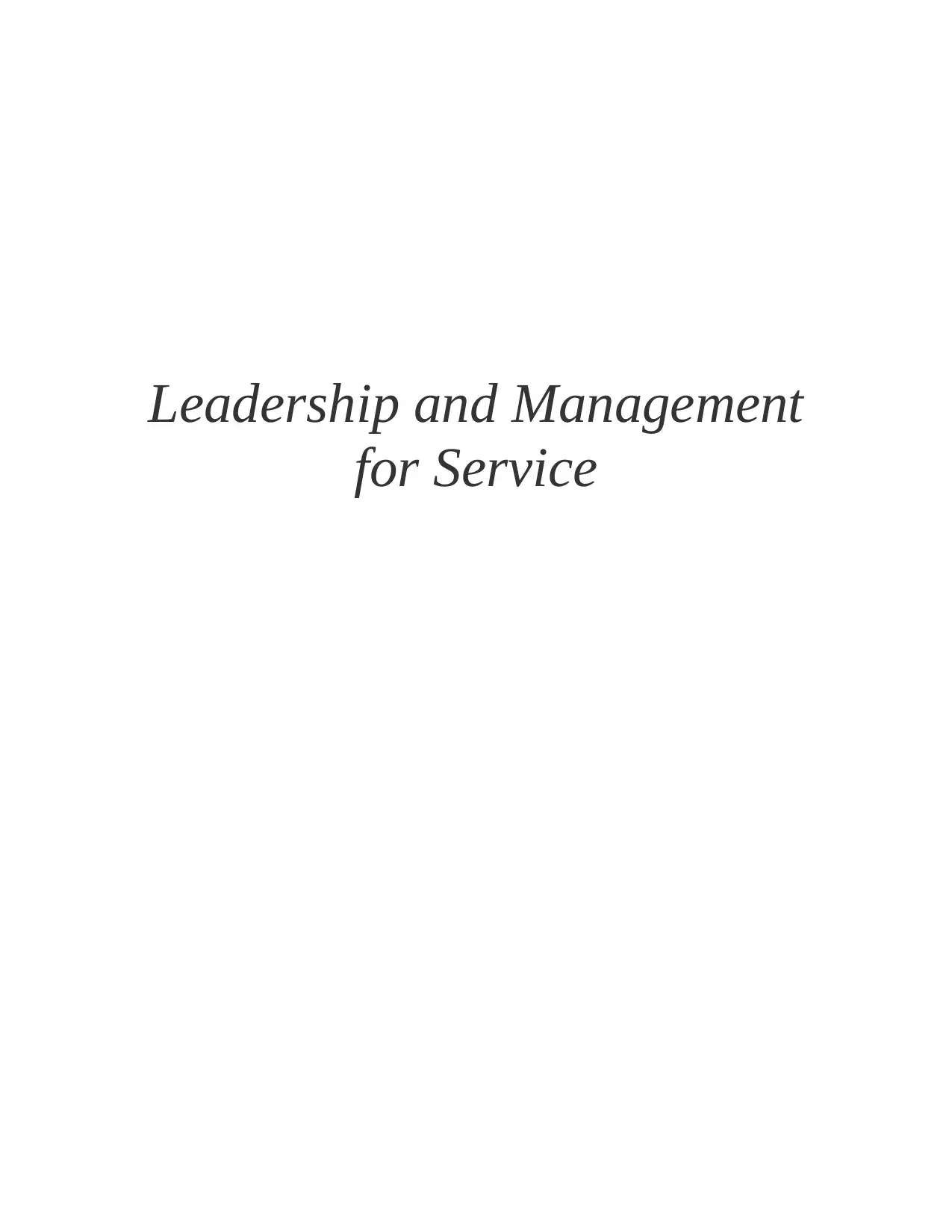
Leadership and Management
for Service
for Service
Paraphrase This Document
Need a fresh take? Get an instant paraphrase of this document with our AI Paraphraser
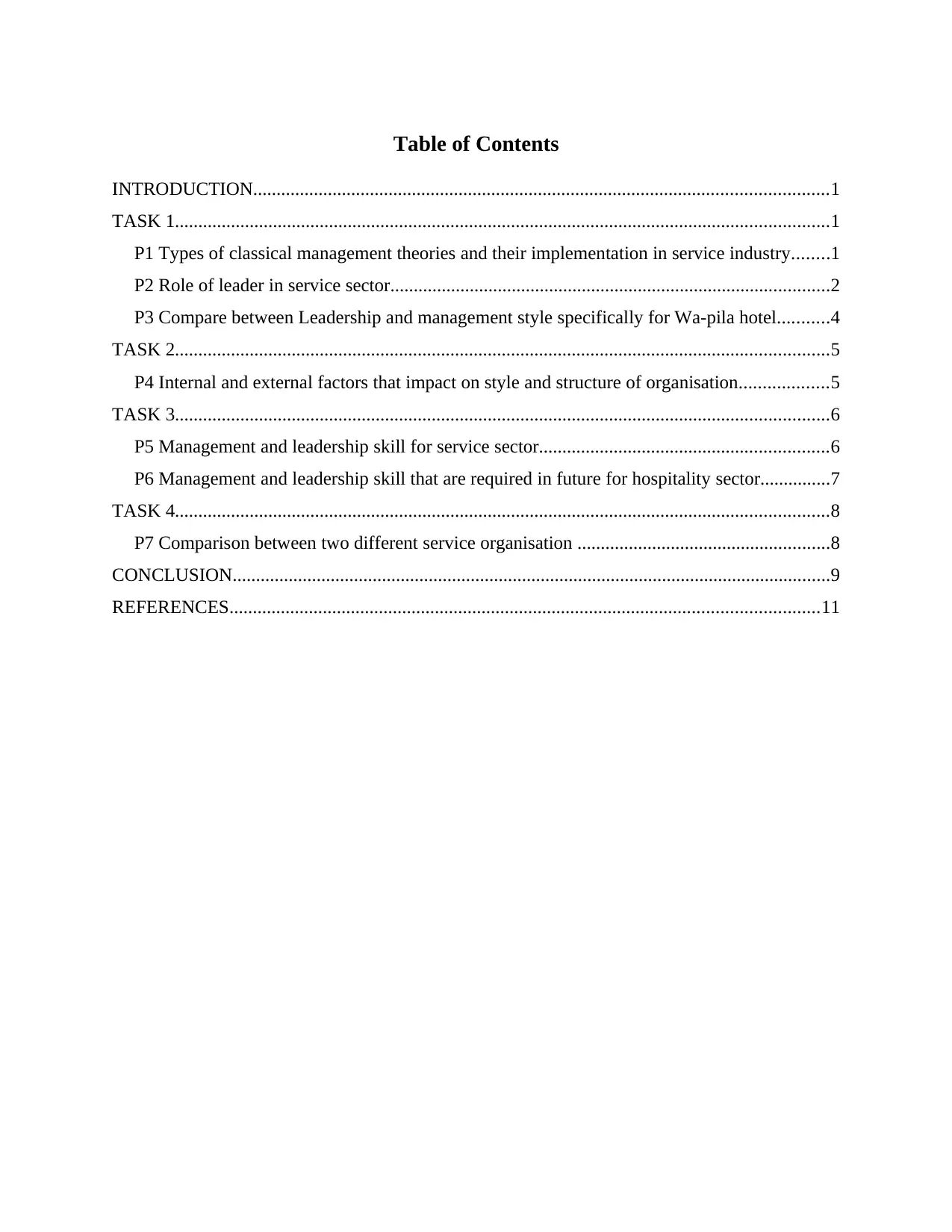
Table of Contents
INTRODUCTION...........................................................................................................................1
TASK 1............................................................................................................................................1
P1 Types of classical management theories and their implementation in service industry........1
P2 Role of leader in service sector..............................................................................................2
P3 Compare between Leadership and management style specifically for Wa-pila hotel...........4
TASK 2............................................................................................................................................5
P4 Internal and external factors that impact on style and structure of organisation...................5
TASK 3............................................................................................................................................6
P5 Management and leadership skill for service sector..............................................................6
P6 Management and leadership skill that are required in future for hospitality sector...............7
TASK 4............................................................................................................................................8
P7 Comparison between two different service organisation ......................................................8
CONCLUSION................................................................................................................................9
REFERENCES..............................................................................................................................11
INTRODUCTION...........................................................................................................................1
TASK 1............................................................................................................................................1
P1 Types of classical management theories and their implementation in service industry........1
P2 Role of leader in service sector..............................................................................................2
P3 Compare between Leadership and management style specifically for Wa-pila hotel...........4
TASK 2............................................................................................................................................5
P4 Internal and external factors that impact on style and structure of organisation...................5
TASK 3............................................................................................................................................6
P5 Management and leadership skill for service sector..............................................................6
P6 Management and leadership skill that are required in future for hospitality sector...............7
TASK 4............................................................................................................................................8
P7 Comparison between two different service organisation ......................................................8
CONCLUSION................................................................................................................................9
REFERENCES..............................................................................................................................11
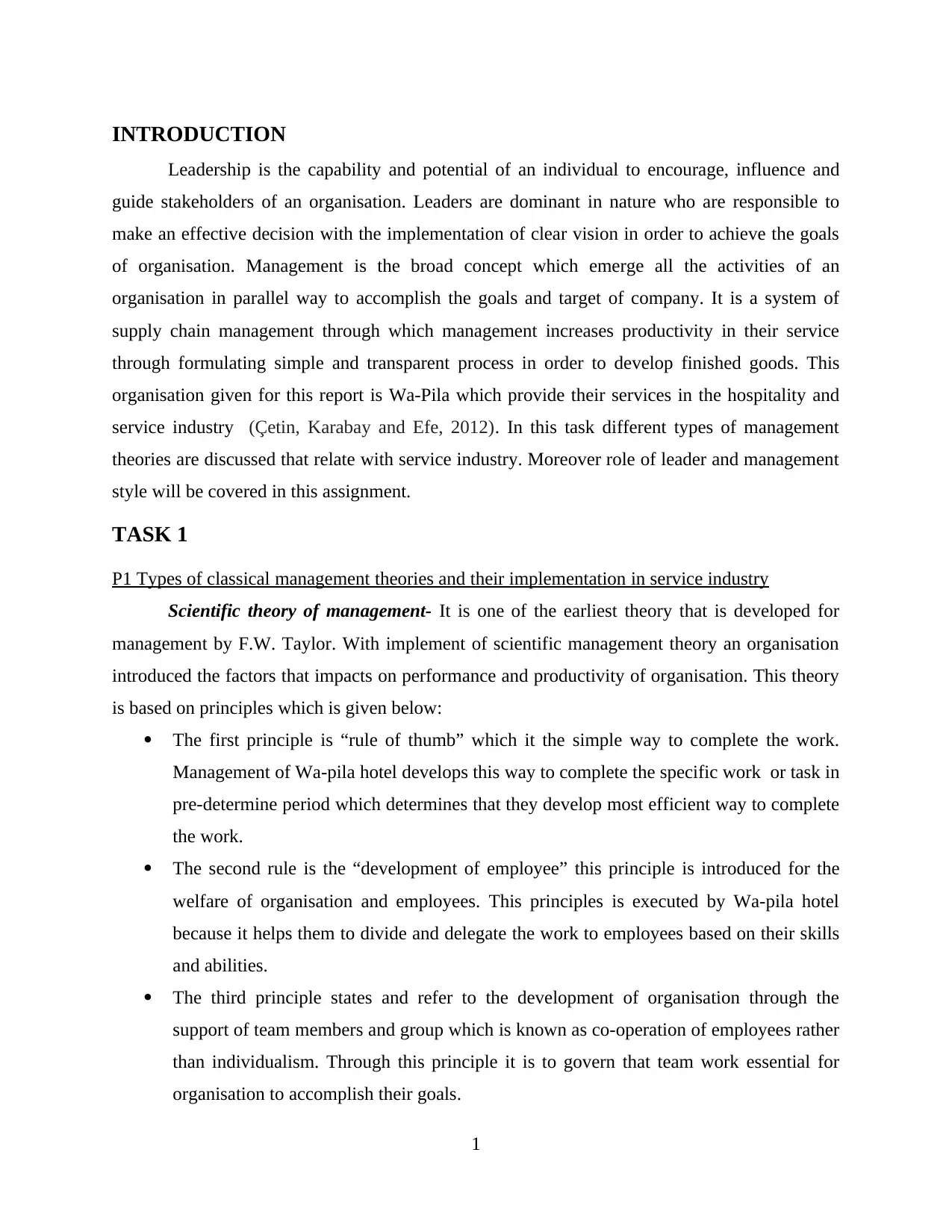
INTRODUCTION
Leadership is the capability and potential of an individual to encourage, influence and
guide stakeholders of an organisation. Leaders are dominant in nature who are responsible to
make an effective decision with the implementation of clear vision in order to achieve the goals
of organisation. Management is the broad concept which emerge all the activities of an
organisation in parallel way to accomplish the goals and target of company. It is a system of
supply chain management through which management increases productivity in their service
through formulating simple and transparent process in order to develop finished goods. This
organisation given for this report is Wa-Pila which provide their services in the hospitality and
service industry (Çetin, Karabay and Efe, 2012). In this task different types of management
theories are discussed that relate with service industry. Moreover role of leader and management
style will be covered in this assignment.
TASK 1
P1 Types of classical management theories and their implementation in service industry
Scientific theory of management- It is one of the earliest theory that is developed for
management by F.W. Taylor. With implement of scientific management theory an organisation
introduced the factors that impacts on performance and productivity of organisation. This theory
is based on principles which is given below:
The first principle is “rule of thumb” which it the simple way to complete the work.
Management of Wa-pila hotel develops this way to complete the specific work or task in
pre-determine period which determines that they develop most efficient way to complete
the work.
The second rule is the “development of employee” this principle is introduced for the
welfare of organisation and employees. This principles is executed by Wa-pila hotel
because it helps them to divide and delegate the work to employees based on their skills
and abilities.
The third principle states and refer to the development of organisation through the
support of team members and group which is known as co-operation of employees rather
than individualism. Through this principle it is to govern that team work essential for
organisation to accomplish their goals.
1
Leadership is the capability and potential of an individual to encourage, influence and
guide stakeholders of an organisation. Leaders are dominant in nature who are responsible to
make an effective decision with the implementation of clear vision in order to achieve the goals
of organisation. Management is the broad concept which emerge all the activities of an
organisation in parallel way to accomplish the goals and target of company. It is a system of
supply chain management through which management increases productivity in their service
through formulating simple and transparent process in order to develop finished goods. This
organisation given for this report is Wa-Pila which provide their services in the hospitality and
service industry (Çetin, Karabay and Efe, 2012). In this task different types of management
theories are discussed that relate with service industry. Moreover role of leader and management
style will be covered in this assignment.
TASK 1
P1 Types of classical management theories and their implementation in service industry
Scientific theory of management- It is one of the earliest theory that is developed for
management by F.W. Taylor. With implement of scientific management theory an organisation
introduced the factors that impacts on performance and productivity of organisation. This theory
is based on principles which is given below:
The first principle is “rule of thumb” which it the simple way to complete the work.
Management of Wa-pila hotel develops this way to complete the specific work or task in
pre-determine period which determines that they develop most efficient way to complete
the work.
The second rule is the “development of employee” this principle is introduced for the
welfare of organisation and employees. This principles is executed by Wa-pila hotel
because it helps them to divide and delegate the work to employees based on their skills
and abilities.
The third principle states and refer to the development of organisation through the
support of team members and group which is known as co-operation of employees rather
than individualism. Through this principle it is to govern that team work essential for
organisation to accomplish their goals.
1
⊘ This is a preview!⊘
Do you want full access?
Subscribe today to unlock all pages.

Trusted by 1+ million students worldwide
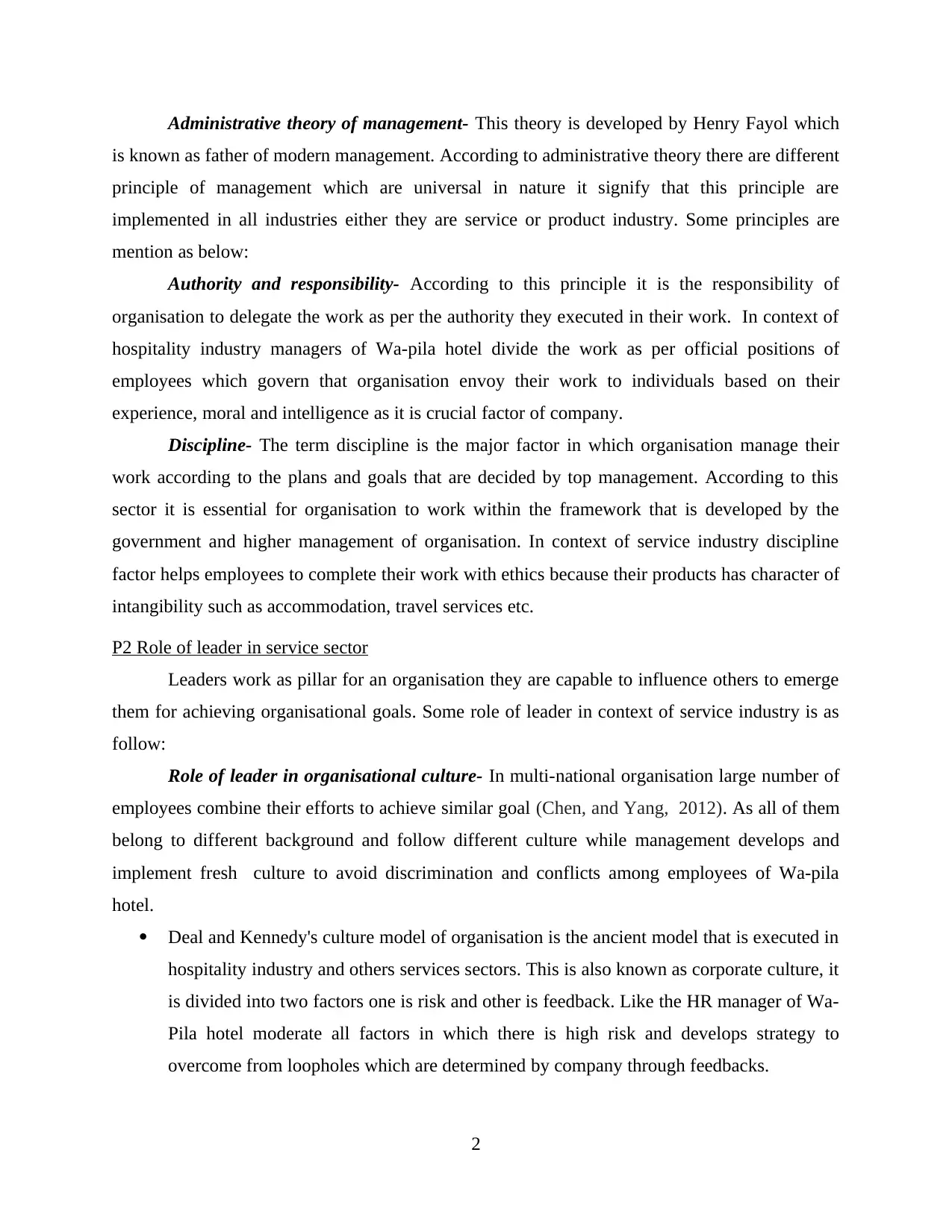
Administrative theory of management- This theory is developed by Henry Fayol which
is known as father of modern management. According to administrative theory there are different
principle of management which are universal in nature it signify that this principle are
implemented in all industries either they are service or product industry. Some principles are
mention as below:
Authority and responsibility- According to this principle it is the responsibility of
organisation to delegate the work as per the authority they executed in their work. In context of
hospitality industry managers of Wa-pila hotel divide the work as per official positions of
employees which govern that organisation envoy their work to individuals based on their
experience, moral and intelligence as it is crucial factor of company.
Discipline- The term discipline is the major factor in which organisation manage their
work according to the plans and goals that are decided by top management. According to this
sector it is essential for organisation to work within the framework that is developed by the
government and higher management of organisation. In context of service industry discipline
factor helps employees to complete their work with ethics because their products has character of
intangibility such as accommodation, travel services etc.
P2 Role of leader in service sector
Leaders work as pillar for an organisation they are capable to influence others to emerge
them for achieving organisational goals. Some role of leader in context of service industry is as
follow:
Role of leader in organisational culture- In multi-national organisation large number of
employees combine their efforts to achieve similar goal (Chen, and Yang, 2012). As all of them
belong to different background and follow different culture while management develops and
implement fresh culture to avoid discrimination and conflicts among employees of Wa-pila
hotel.
Deal and Kennedy's culture model of organisation is the ancient model that is executed in
hospitality industry and others services sectors. This is also known as corporate culture, it
is divided into two factors one is risk and other is feedback. Like the HR manager of Wa-
Pila hotel moderate all factors in which there is high risk and develops strategy to
overcome from loopholes which are determined by company through feedbacks.
2
is known as father of modern management. According to administrative theory there are different
principle of management which are universal in nature it signify that this principle are
implemented in all industries either they are service or product industry. Some principles are
mention as below:
Authority and responsibility- According to this principle it is the responsibility of
organisation to delegate the work as per the authority they executed in their work. In context of
hospitality industry managers of Wa-pila hotel divide the work as per official positions of
employees which govern that organisation envoy their work to individuals based on their
experience, moral and intelligence as it is crucial factor of company.
Discipline- The term discipline is the major factor in which organisation manage their
work according to the plans and goals that are decided by top management. According to this
sector it is essential for organisation to work within the framework that is developed by the
government and higher management of organisation. In context of service industry discipline
factor helps employees to complete their work with ethics because their products has character of
intangibility such as accommodation, travel services etc.
P2 Role of leader in service sector
Leaders work as pillar for an organisation they are capable to influence others to emerge
them for achieving organisational goals. Some role of leader in context of service industry is as
follow:
Role of leader in organisational culture- In multi-national organisation large number of
employees combine their efforts to achieve similar goal (Chen, and Yang, 2012). As all of them
belong to different background and follow different culture while management develops and
implement fresh culture to avoid discrimination and conflicts among employees of Wa-pila
hotel.
Deal and Kennedy's culture model of organisation is the ancient model that is executed in
hospitality industry and others services sectors. This is also known as corporate culture, it
is divided into two factors one is risk and other is feedback. Like the HR manager of Wa-
Pila hotel moderate all factors in which there is high risk and develops strategy to
overcome from loopholes which are determined by company through feedbacks.
2
Paraphrase This Document
Need a fresh take? Get an instant paraphrase of this document with our AI Paraphraser
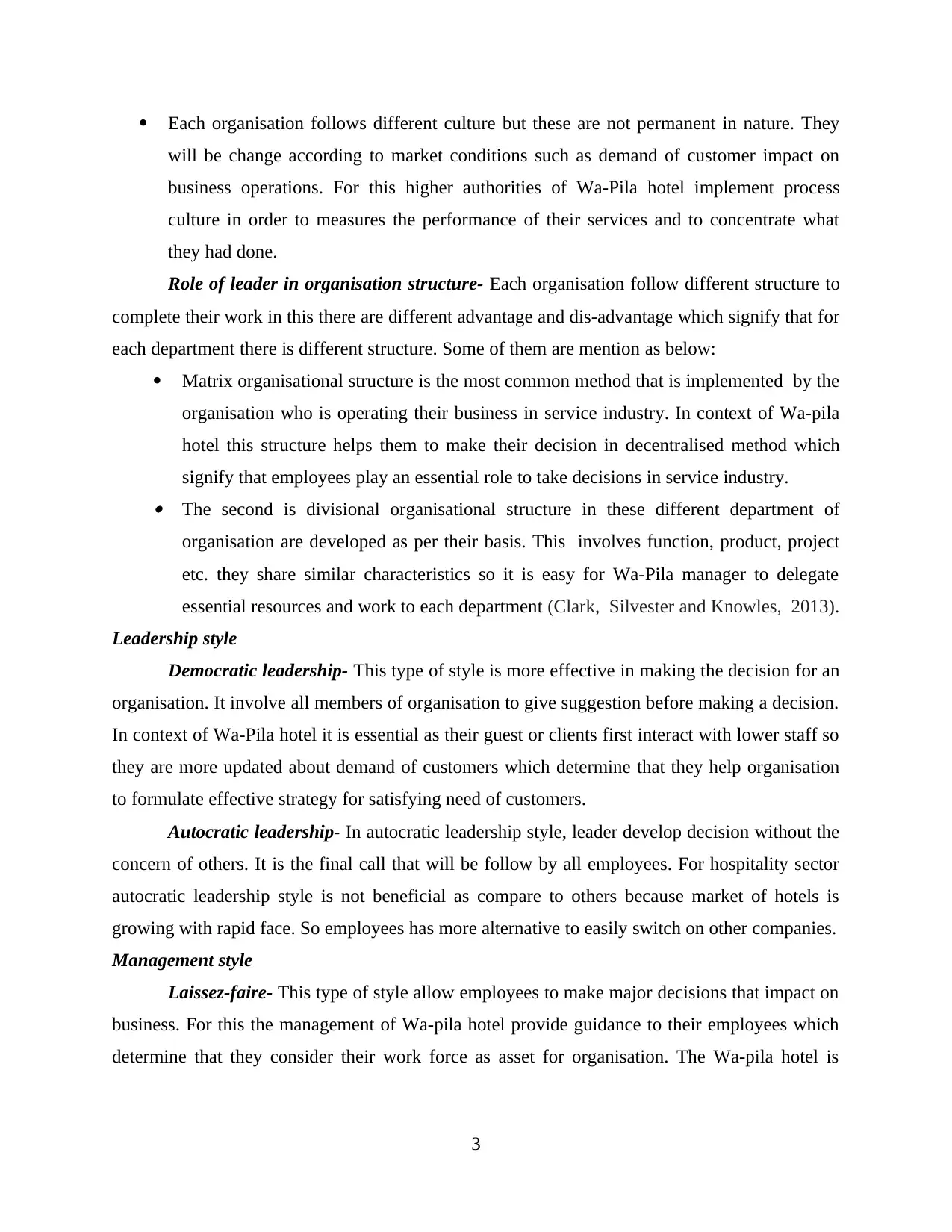
Each organisation follows different culture but these are not permanent in nature. They
will be change according to market conditions such as demand of customer impact on
business operations. For this higher authorities of Wa-Pila hotel implement process
culture in order to measures the performance of their services and to concentrate what
they had done.
Role of leader in organisation structure- Each organisation follow different structure to
complete their work in this there are different advantage and dis-advantage which signify that for
each department there is different structure. Some of them are mention as below:
Matrix organisational structure is the most common method that is implemented by the
organisation who is operating their business in service industry. In context of Wa-pila
hotel this structure helps them to make their decision in decentralised method which
signify that employees play an essential role to take decisions in service industry. The second is divisional organisational structure in these different department of
organisation are developed as per their basis. This involves function, product, project
etc. they share similar characteristics so it is easy for Wa-Pila manager to delegate
essential resources and work to each department (Clark, Silvester and Knowles, 2013).
Leadership style
Democratic leadership- This type of style is more effective in making the decision for an
organisation. It involve all members of organisation to give suggestion before making a decision.
In context of Wa-Pila hotel it is essential as their guest or clients first interact with lower staff so
they are more updated about demand of customers which determine that they help organisation
to formulate effective strategy for satisfying need of customers.
Autocratic leadership- In autocratic leadership style, leader develop decision without the
concern of others. It is the final call that will be follow by all employees. For hospitality sector
autocratic leadership style is not beneficial as compare to others because market of hotels is
growing with rapid face. So employees has more alternative to easily switch on other companies.
Management style
Laissez-faire- This type of style allow employees to make major decisions that impact on
business. For this the management of Wa-pila hotel provide guidance to their employees which
determine that they consider their work force as asset for organisation. The Wa-pila hotel is
3
will be change according to market conditions such as demand of customer impact on
business operations. For this higher authorities of Wa-Pila hotel implement process
culture in order to measures the performance of their services and to concentrate what
they had done.
Role of leader in organisation structure- Each organisation follow different structure to
complete their work in this there are different advantage and dis-advantage which signify that for
each department there is different structure. Some of them are mention as below:
Matrix organisational structure is the most common method that is implemented by the
organisation who is operating their business in service industry. In context of Wa-pila
hotel this structure helps them to make their decision in decentralised method which
signify that employees play an essential role to take decisions in service industry. The second is divisional organisational structure in these different department of
organisation are developed as per their basis. This involves function, product, project
etc. they share similar characteristics so it is easy for Wa-Pila manager to delegate
essential resources and work to each department (Clark, Silvester and Knowles, 2013).
Leadership style
Democratic leadership- This type of style is more effective in making the decision for an
organisation. It involve all members of organisation to give suggestion before making a decision.
In context of Wa-Pila hotel it is essential as their guest or clients first interact with lower staff so
they are more updated about demand of customers which determine that they help organisation
to formulate effective strategy for satisfying need of customers.
Autocratic leadership- In autocratic leadership style, leader develop decision without the
concern of others. It is the final call that will be follow by all employees. For hospitality sector
autocratic leadership style is not beneficial as compare to others because market of hotels is
growing with rapid face. So employees has more alternative to easily switch on other companies.
Management style
Laissez-faire- This type of style allow employees to make major decisions that impact on
business. For this the management of Wa-pila hotel provide guidance to their employees which
determine that they consider their work force as asset for organisation. The Wa-pila hotel is
3
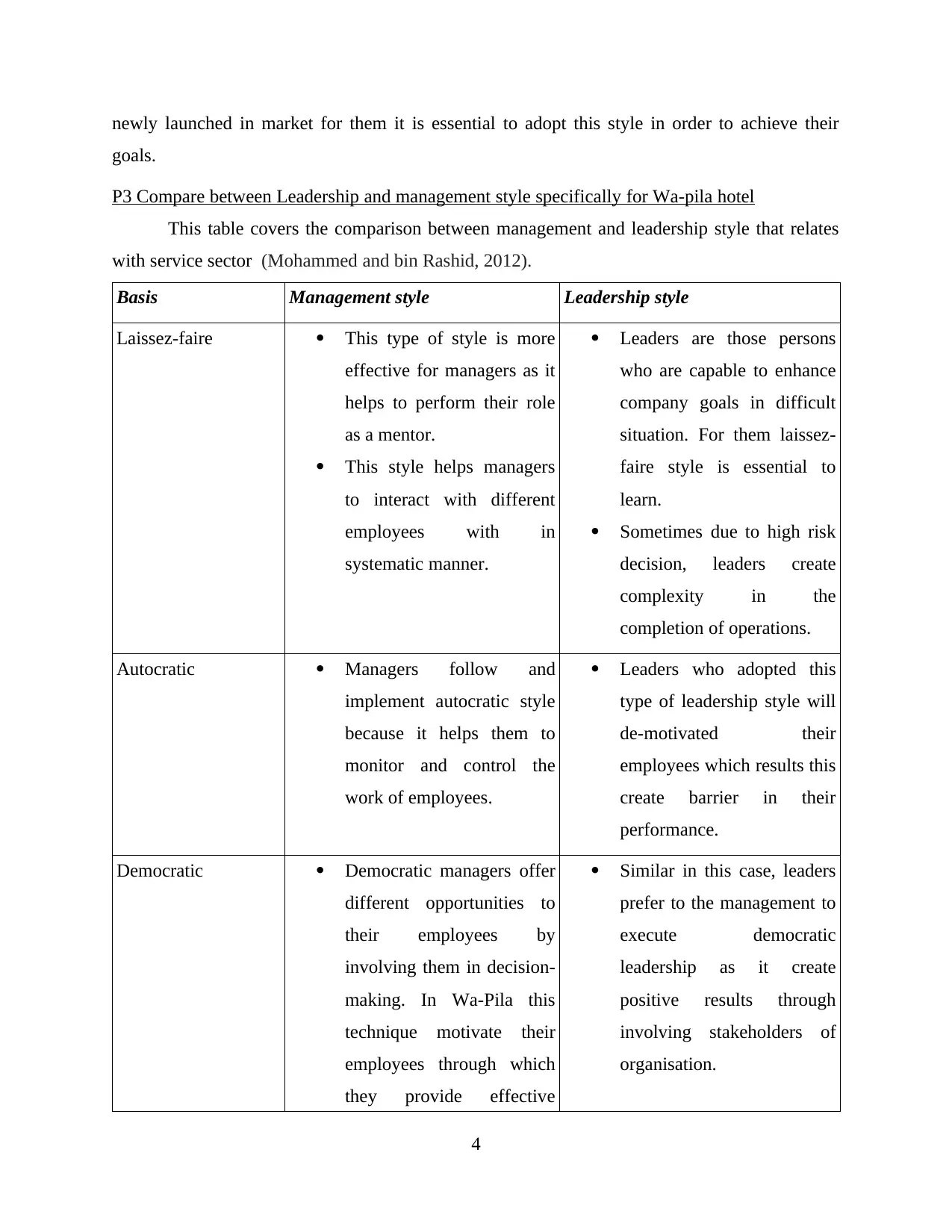
newly launched in market for them it is essential to adopt this style in order to achieve their
goals.
P3 Compare between Leadership and management style specifically for Wa-pila hotel
This table covers the comparison between management and leadership style that relates
with service sector (Mohammed and bin Rashid, 2012).
Basis Management style Leadership style
Laissez-faire This type of style is more
effective for managers as it
helps to perform their role
as a mentor.
This style helps managers
to interact with different
employees with in
systematic manner.
Leaders are those persons
who are capable to enhance
company goals in difficult
situation. For them laissez-
faire style is essential to
learn.
Sometimes due to high risk
decision, leaders create
complexity in the
completion of operations.
Autocratic Managers follow and
implement autocratic style
because it helps them to
monitor and control the
work of employees.
Leaders who adopted this
type of leadership style will
de-motivated their
employees which results this
create barrier in their
performance.
Democratic Democratic managers offer
different opportunities to
their employees by
involving them in decision-
making. In Wa-Pila this
technique motivate their
employees through which
they provide effective
Similar in this case, leaders
prefer to the management to
execute democratic
leadership as it create
positive results through
involving stakeholders of
organisation.
4
goals.
P3 Compare between Leadership and management style specifically for Wa-pila hotel
This table covers the comparison between management and leadership style that relates
with service sector (Mohammed and bin Rashid, 2012).
Basis Management style Leadership style
Laissez-faire This type of style is more
effective for managers as it
helps to perform their role
as a mentor.
This style helps managers
to interact with different
employees with in
systematic manner.
Leaders are those persons
who are capable to enhance
company goals in difficult
situation. For them laissez-
faire style is essential to
learn.
Sometimes due to high risk
decision, leaders create
complexity in the
completion of operations.
Autocratic Managers follow and
implement autocratic style
because it helps them to
monitor and control the
work of employees.
Leaders who adopted this
type of leadership style will
de-motivated their
employees which results this
create barrier in their
performance.
Democratic Democratic managers offer
different opportunities to
their employees by
involving them in decision-
making. In Wa-Pila this
technique motivate their
employees through which
they provide effective
Similar in this case, leaders
prefer to the management to
execute democratic
leadership as it create
positive results through
involving stakeholders of
organisation.
4
⊘ This is a preview!⊘
Do you want full access?
Subscribe today to unlock all pages.

Trusted by 1+ million students worldwide
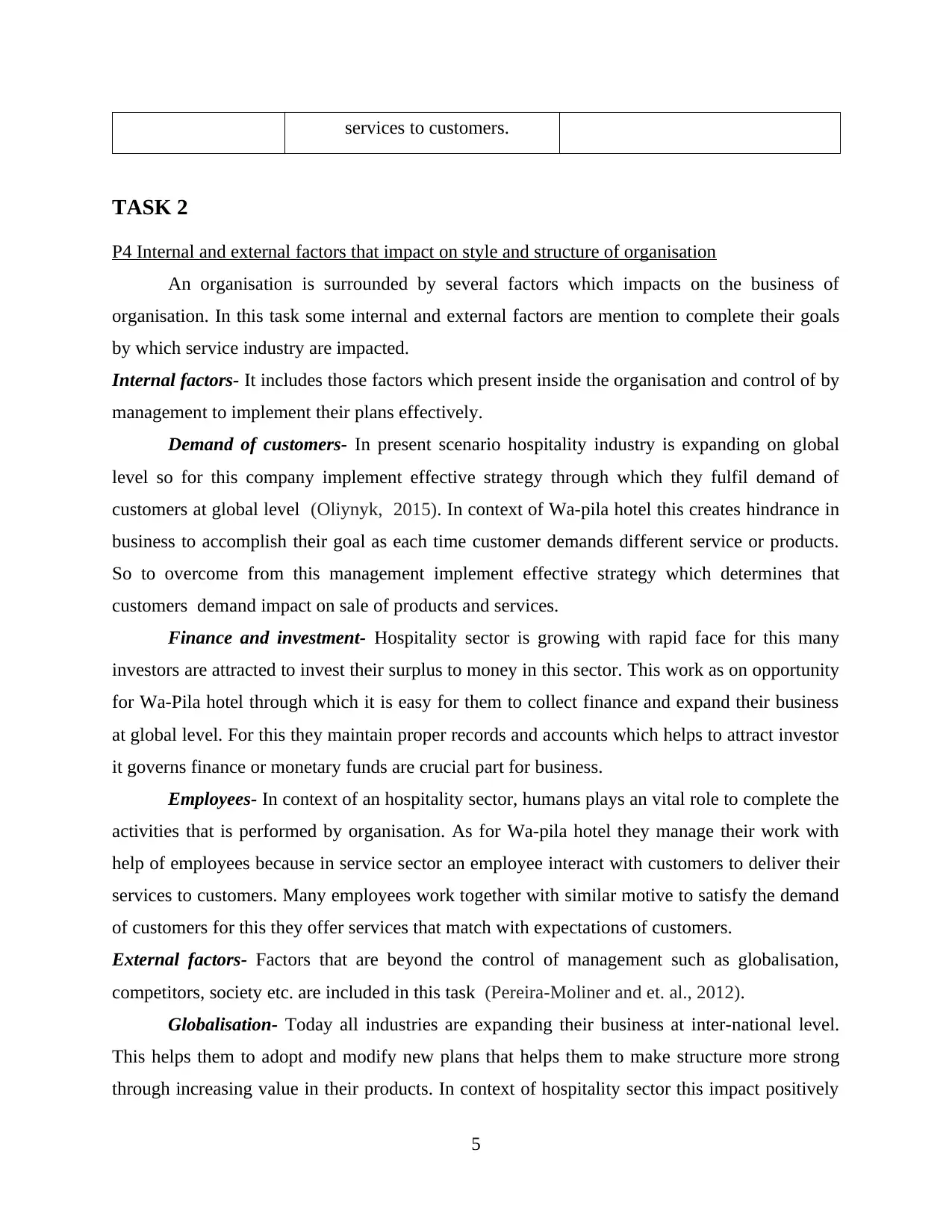
services to customers.
TASK 2
P4 Internal and external factors that impact on style and structure of organisation
An organisation is surrounded by several factors which impacts on the business of
organisation. In this task some internal and external factors are mention to complete their goals
by which service industry are impacted.
Internal factors- It includes those factors which present inside the organisation and control of by
management to implement their plans effectively.
Demand of customers- In present scenario hospitality industry is expanding on global
level so for this company implement effective strategy through which they fulfil demand of
customers at global level (Oliynyk, 2015). In context of Wa-pila hotel this creates hindrance in
business to accomplish their goal as each time customer demands different service or products.
So to overcome from this management implement effective strategy which determines that
customers demand impact on sale of products and services.
Finance and investment- Hospitality sector is growing with rapid face for this many
investors are attracted to invest their surplus to money in this sector. This work as on opportunity
for Wa-Pila hotel through which it is easy for them to collect finance and expand their business
at global level. For this they maintain proper records and accounts which helps to attract investor
it governs finance or monetary funds are crucial part for business.
Employees- In context of an hospitality sector, humans plays an vital role to complete the
activities that is performed by organisation. As for Wa-pila hotel they manage their work with
help of employees because in service sector an employee interact with customers to deliver their
services to customers. Many employees work together with similar motive to satisfy the demand
of customers for this they offer services that match with expectations of customers.
External factors- Factors that are beyond the control of management such as globalisation,
competitors, society etc. are included in this task (Pereira-Moliner and et. al., 2012).
Globalisation- Today all industries are expanding their business at inter-national level.
This helps them to adopt and modify new plans that helps them to make structure more strong
through increasing value in their products. In context of hospitality sector this impact positively
5
TASK 2
P4 Internal and external factors that impact on style and structure of organisation
An organisation is surrounded by several factors which impacts on the business of
organisation. In this task some internal and external factors are mention to complete their goals
by which service industry are impacted.
Internal factors- It includes those factors which present inside the organisation and control of by
management to implement their plans effectively.
Demand of customers- In present scenario hospitality industry is expanding on global
level so for this company implement effective strategy through which they fulfil demand of
customers at global level (Oliynyk, 2015). In context of Wa-pila hotel this creates hindrance in
business to accomplish their goal as each time customer demands different service or products.
So to overcome from this management implement effective strategy which determines that
customers demand impact on sale of products and services.
Finance and investment- Hospitality sector is growing with rapid face for this many
investors are attracted to invest their surplus to money in this sector. This work as on opportunity
for Wa-Pila hotel through which it is easy for them to collect finance and expand their business
at global level. For this they maintain proper records and accounts which helps to attract investor
it governs finance or monetary funds are crucial part for business.
Employees- In context of an hospitality sector, humans plays an vital role to complete the
activities that is performed by organisation. As for Wa-pila hotel they manage their work with
help of employees because in service sector an employee interact with customers to deliver their
services to customers. Many employees work together with similar motive to satisfy the demand
of customers for this they offer services that match with expectations of customers.
External factors- Factors that are beyond the control of management such as globalisation,
competitors, society etc. are included in this task (Pereira-Moliner and et. al., 2012).
Globalisation- Today all industries are expanding their business at inter-national level.
This helps them to adopt and modify new plans that helps them to make structure more strong
through increasing value in their products. In context of hospitality sector this impact positively
5
Paraphrase This Document
Need a fresh take? Get an instant paraphrase of this document with our AI Paraphraser
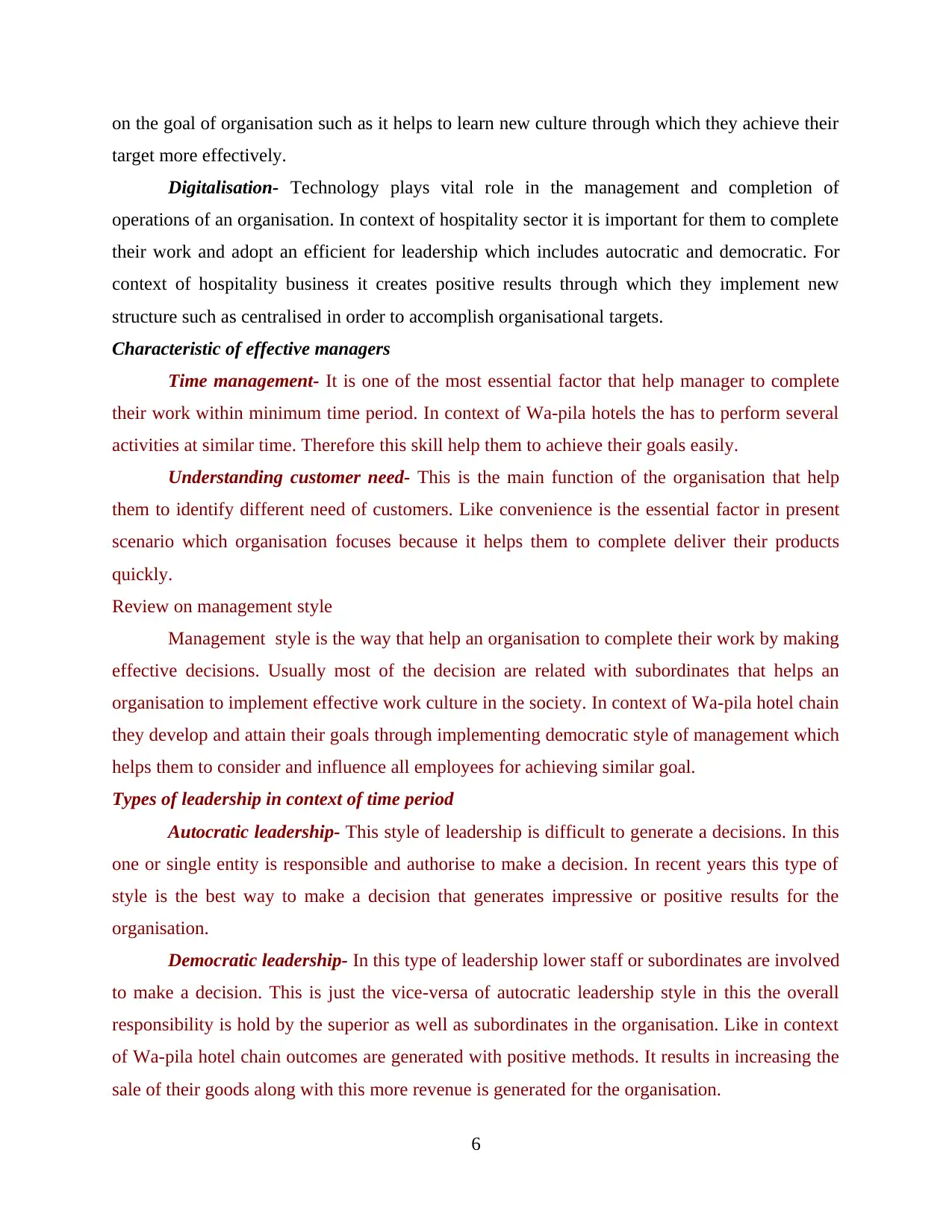
on the goal of organisation such as it helps to learn new culture through which they achieve their
target more effectively.
Digitalisation- Technology plays vital role in the management and completion of
operations of an organisation. In context of hospitality sector it is important for them to complete
their work and adopt an efficient for leadership which includes autocratic and democratic. For
context of hospitality business it creates positive results through which they implement new
structure such as centralised in order to accomplish organisational targets.
Characteristic of effective managers
Time management- It is one of the most essential factor that help manager to complete
their work within minimum time period. In context of Wa-pila hotels the has to perform several
activities at similar time. Therefore this skill help them to achieve their goals easily.
Understanding customer need- This is the main function of the organisation that help
them to identify different need of customers. Like convenience is the essential factor in present
scenario which organisation focuses because it helps them to complete deliver their products
quickly.
Review on management style
Management style is the way that help an organisation to complete their work by making
effective decisions. Usually most of the decision are related with subordinates that helps an
organisation to implement effective work culture in the society. In context of Wa-pila hotel chain
they develop and attain their goals through implementing democratic style of management which
helps them to consider and influence all employees for achieving similar goal.
Types of leadership in context of time period
Autocratic leadership- This style of leadership is difficult to generate a decisions. In this
one or single entity is responsible and authorise to make a decision. In recent years this type of
style is the best way to make a decision that generates impressive or positive results for the
organisation.
Democratic leadership- In this type of leadership lower staff or subordinates are involved
to make a decision. This is just the vice-versa of autocratic leadership style in this the overall
responsibility is hold by the superior as well as subordinates in the organisation. Like in context
of Wa-pila hotel chain outcomes are generated with positive methods. It results in increasing the
sale of their goods along with this more revenue is generated for the organisation.
6
target more effectively.
Digitalisation- Technology plays vital role in the management and completion of
operations of an organisation. In context of hospitality sector it is important for them to complete
their work and adopt an efficient for leadership which includes autocratic and democratic. For
context of hospitality business it creates positive results through which they implement new
structure such as centralised in order to accomplish organisational targets.
Characteristic of effective managers
Time management- It is one of the most essential factor that help manager to complete
their work within minimum time period. In context of Wa-pila hotels the has to perform several
activities at similar time. Therefore this skill help them to achieve their goals easily.
Understanding customer need- This is the main function of the organisation that help
them to identify different need of customers. Like convenience is the essential factor in present
scenario which organisation focuses because it helps them to complete deliver their products
quickly.
Review on management style
Management style is the way that help an organisation to complete their work by making
effective decisions. Usually most of the decision are related with subordinates that helps an
organisation to implement effective work culture in the society. In context of Wa-pila hotel chain
they develop and attain their goals through implementing democratic style of management which
helps them to consider and influence all employees for achieving similar goal.
Types of leadership in context of time period
Autocratic leadership- This style of leadership is difficult to generate a decisions. In this
one or single entity is responsible and authorise to make a decision. In recent years this type of
style is the best way to make a decision that generates impressive or positive results for the
organisation.
Democratic leadership- In this type of leadership lower staff or subordinates are involved
to make a decision. This is just the vice-versa of autocratic leadership style in this the overall
responsibility is hold by the superior as well as subordinates in the organisation. Like in context
of Wa-pila hotel chain outcomes are generated with positive methods. It results in increasing the
sale of their goods along with this more revenue is generated for the organisation.
6
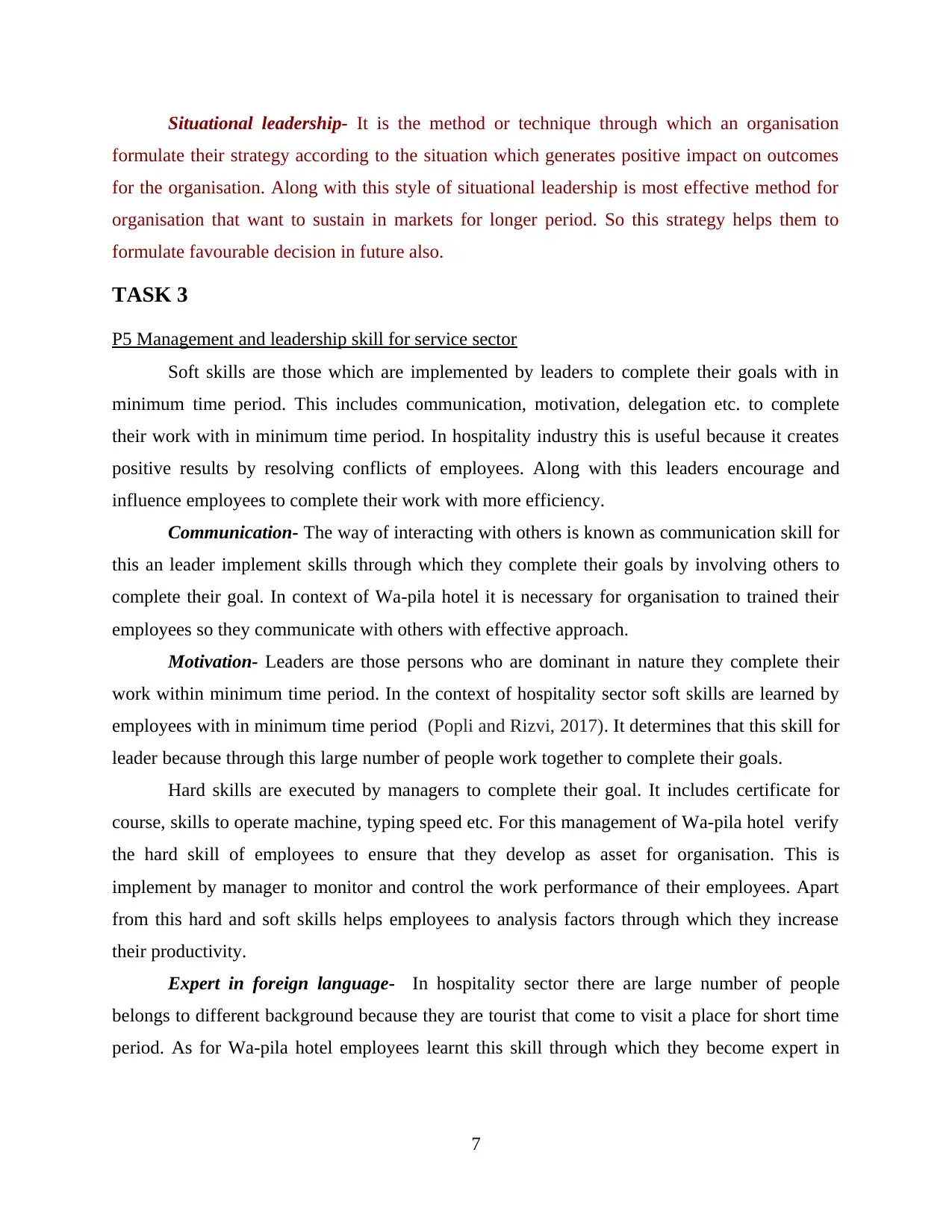
Situational leadership- It is the method or technique through which an organisation
formulate their strategy according to the situation which generates positive impact on outcomes
for the organisation. Along with this style of situational leadership is most effective method for
organisation that want to sustain in markets for longer period. So this strategy helps them to
formulate favourable decision in future also.
TASK 3
P5 Management and leadership skill for service sector
Soft skills are those which are implemented by leaders to complete their goals with in
minimum time period. This includes communication, motivation, delegation etc. to complete
their work with in minimum time period. In hospitality industry this is useful because it creates
positive results by resolving conflicts of employees. Along with this leaders encourage and
influence employees to complete their work with more efficiency.
Communication- The way of interacting with others is known as communication skill for
this an leader implement skills through which they complete their goals by involving others to
complete their goal. In context of Wa-pila hotel it is necessary for organisation to trained their
employees so they communicate with others with effective approach.
Motivation- Leaders are those persons who are dominant in nature they complete their
work within minimum time period. In the context of hospitality sector soft skills are learned by
employees with in minimum time period (Popli and Rizvi, 2017). It determines that this skill for
leader because through this large number of people work together to complete their goals.
Hard skills are executed by managers to complete their goal. It includes certificate for
course, skills to operate machine, typing speed etc. For this management of Wa-pila hotel verify
the hard skill of employees to ensure that they develop as asset for organisation. This is
implement by manager to monitor and control the work performance of their employees. Apart
from this hard and soft skills helps employees to analysis factors through which they increase
their productivity.
Expert in foreign language- In hospitality sector there are large number of people
belongs to different background because they are tourist that come to visit a place for short time
period. As for Wa-pila hotel employees learnt this skill through which they become expert in
7
formulate their strategy according to the situation which generates positive impact on outcomes
for the organisation. Along with this style of situational leadership is most effective method for
organisation that want to sustain in markets for longer period. So this strategy helps them to
formulate favourable decision in future also.
TASK 3
P5 Management and leadership skill for service sector
Soft skills are those which are implemented by leaders to complete their goals with in
minimum time period. This includes communication, motivation, delegation etc. to complete
their work with in minimum time period. In hospitality industry this is useful because it creates
positive results by resolving conflicts of employees. Along with this leaders encourage and
influence employees to complete their work with more efficiency.
Communication- The way of interacting with others is known as communication skill for
this an leader implement skills through which they complete their goals by involving others to
complete their goal. In context of Wa-pila hotel it is necessary for organisation to trained their
employees so they communicate with others with effective approach.
Motivation- Leaders are those persons who are dominant in nature they complete their
work within minimum time period. In the context of hospitality sector soft skills are learned by
employees with in minimum time period (Popli and Rizvi, 2017). It determines that this skill for
leader because through this large number of people work together to complete their goals.
Hard skills are executed by managers to complete their goal. It includes certificate for
course, skills to operate machine, typing speed etc. For this management of Wa-pila hotel verify
the hard skill of employees to ensure that they develop as asset for organisation. This is
implement by manager to monitor and control the work performance of their employees. Apart
from this hard and soft skills helps employees to analysis factors through which they increase
their productivity.
Expert in foreign language- In hospitality sector there are large number of people
belongs to different background because they are tourist that come to visit a place for short time
period. As for Wa-pila hotel employees learnt this skill through which they become expert in
7
⊘ This is a preview!⊘
Do you want full access?
Subscribe today to unlock all pages.

Trusted by 1+ million students worldwide
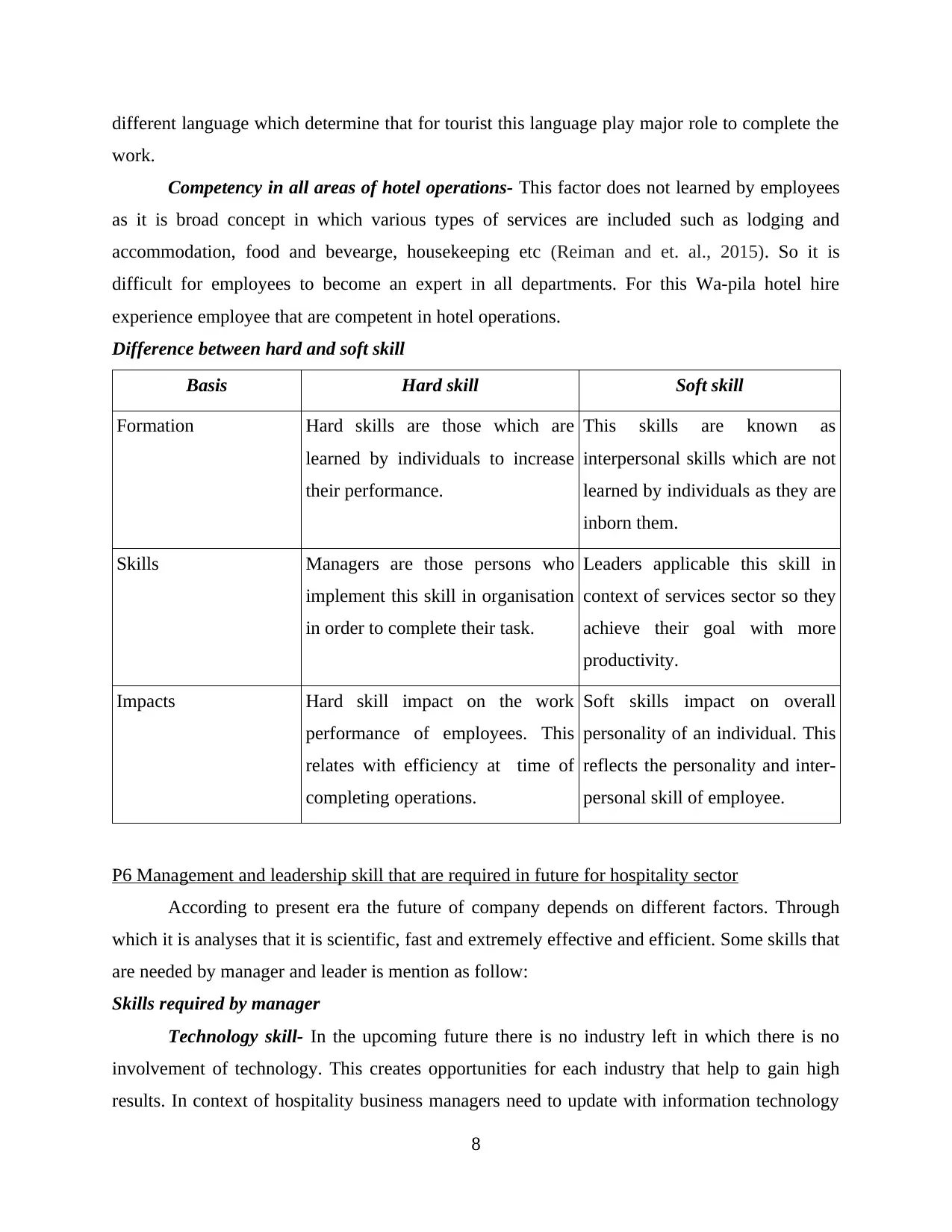
different language which determine that for tourist this language play major role to complete the
work.
Competency in all areas of hotel operations- This factor does not learned by employees
as it is broad concept in which various types of services are included such as lodging and
accommodation, food and bevearge, housekeeping etc (Reiman and et. al., 2015). So it is
difficult for employees to become an expert in all departments. For this Wa-pila hotel hire
experience employee that are competent in hotel operations.
Difference between hard and soft skill
Basis Hard skill Soft skill
Formation Hard skills are those which are
learned by individuals to increase
their performance.
This skills are known as
interpersonal skills which are not
learned by individuals as they are
inborn them.
Skills Managers are those persons who
implement this skill in organisation
in order to complete their task.
Leaders applicable this skill in
context of services sector so they
achieve their goal with more
productivity.
Impacts Hard skill impact on the work
performance of employees. This
relates with efficiency at time of
completing operations.
Soft skills impact on overall
personality of an individual. This
reflects the personality and inter-
personal skill of employee.
P6 Management and leadership skill that are required in future for hospitality sector
According to present era the future of company depends on different factors. Through
which it is analyses that it is scientific, fast and extremely effective and efficient. Some skills that
are needed by manager and leader is mention as follow:
Skills required by manager
Technology skill- In the upcoming future there is no industry left in which there is no
involvement of technology. This creates opportunities for each industry that help to gain high
results. In context of hospitality business managers need to update with information technology
8
work.
Competency in all areas of hotel operations- This factor does not learned by employees
as it is broad concept in which various types of services are included such as lodging and
accommodation, food and bevearge, housekeeping etc (Reiman and et. al., 2015). So it is
difficult for employees to become an expert in all departments. For this Wa-pila hotel hire
experience employee that are competent in hotel operations.
Difference between hard and soft skill
Basis Hard skill Soft skill
Formation Hard skills are those which are
learned by individuals to increase
their performance.
This skills are known as
interpersonal skills which are not
learned by individuals as they are
inborn them.
Skills Managers are those persons who
implement this skill in organisation
in order to complete their task.
Leaders applicable this skill in
context of services sector so they
achieve their goal with more
productivity.
Impacts Hard skill impact on the work
performance of employees. This
relates with efficiency at time of
completing operations.
Soft skills impact on overall
personality of an individual. This
reflects the personality and inter-
personal skill of employee.
P6 Management and leadership skill that are required in future for hospitality sector
According to present era the future of company depends on different factors. Through
which it is analyses that it is scientific, fast and extremely effective and efficient. Some skills that
are needed by manager and leader is mention as follow:
Skills required by manager
Technology skill- In the upcoming future there is no industry left in which there is no
involvement of technology. This creates opportunities for each industry that help to gain high
results. In context of hospitality business managers need to update with information technology
8
Paraphrase This Document
Need a fresh take? Get an instant paraphrase of this document with our AI Paraphraser
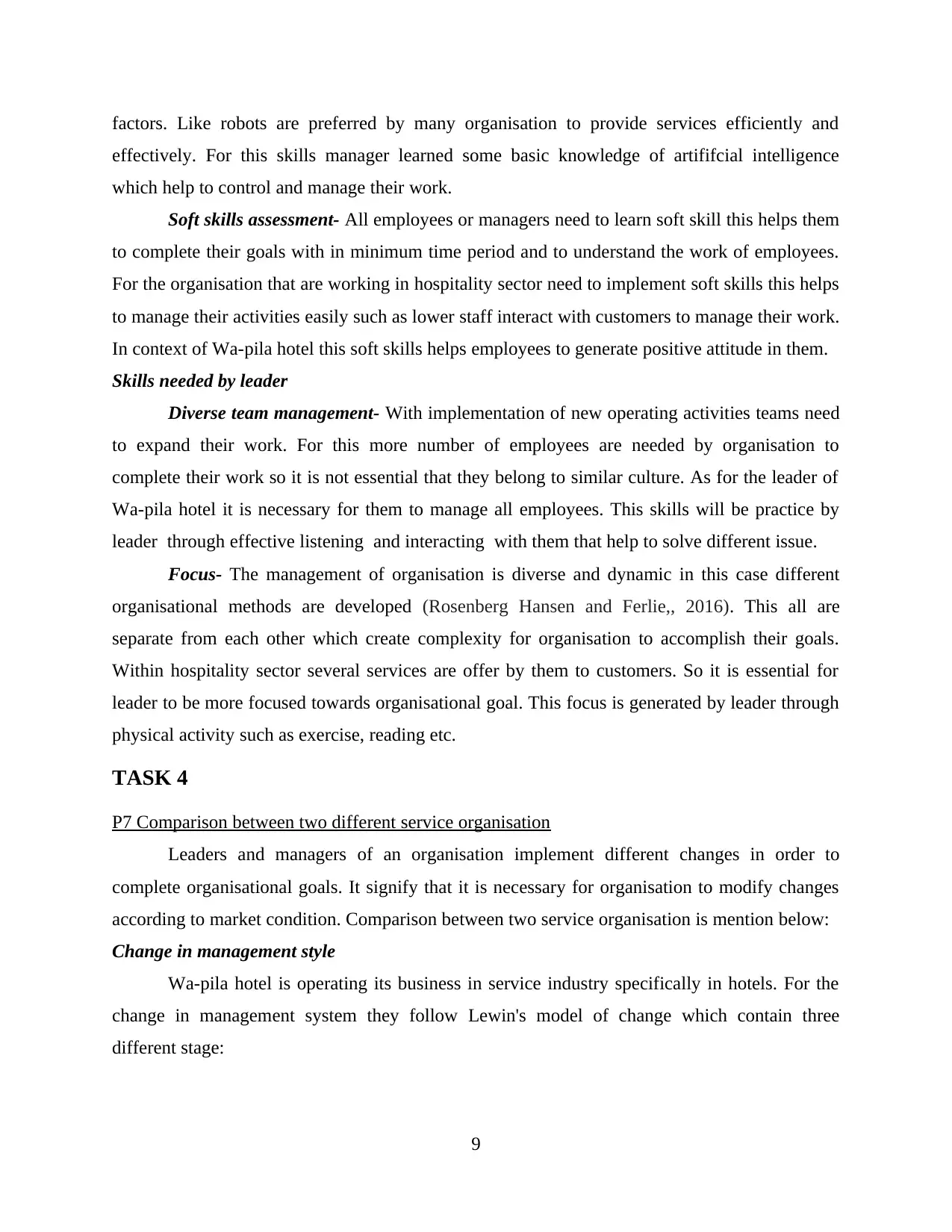
factors. Like robots are preferred by many organisation to provide services efficiently and
effectively. For this skills manager learned some basic knowledge of artififcial intelligence
which help to control and manage their work.
Soft skills assessment- All employees or managers need to learn soft skill this helps them
to complete their goals with in minimum time period and to understand the work of employees.
For the organisation that are working in hospitality sector need to implement soft skills this helps
to manage their activities easily such as lower staff interact with customers to manage their work.
In context of Wa-pila hotel this soft skills helps employees to generate positive attitude in them.
Skills needed by leader
Diverse team management- With implementation of new operating activities teams need
to expand their work. For this more number of employees are needed by organisation to
complete their work so it is not essential that they belong to similar culture. As for the leader of
Wa-pila hotel it is necessary for them to manage all employees. This skills will be practice by
leader through effective listening and interacting with them that help to solve different issue.
Focus- The management of organisation is diverse and dynamic in this case different
organisational methods are developed (Rosenberg Hansen and Ferlie,, 2016). This all are
separate from each other which create complexity for organisation to accomplish their goals.
Within hospitality sector several services are offer by them to customers. So it is essential for
leader to be more focused towards organisational goal. This focus is generated by leader through
physical activity such as exercise, reading etc.
TASK 4
P7 Comparison between two different service organisation
Leaders and managers of an organisation implement different changes in order to
complete organisational goals. It signify that it is necessary for organisation to modify changes
according to market condition. Comparison between two service organisation is mention below:
Change in management style
Wa-pila hotel is operating its business in service industry specifically in hotels. For the
change in management system they follow Lewin's model of change which contain three
different stage:
9
effectively. For this skills manager learned some basic knowledge of artififcial intelligence
which help to control and manage their work.
Soft skills assessment- All employees or managers need to learn soft skill this helps them
to complete their goals with in minimum time period and to understand the work of employees.
For the organisation that are working in hospitality sector need to implement soft skills this helps
to manage their activities easily such as lower staff interact with customers to manage their work.
In context of Wa-pila hotel this soft skills helps employees to generate positive attitude in them.
Skills needed by leader
Diverse team management- With implementation of new operating activities teams need
to expand their work. For this more number of employees are needed by organisation to
complete their work so it is not essential that they belong to similar culture. As for the leader of
Wa-pila hotel it is necessary for them to manage all employees. This skills will be practice by
leader through effective listening and interacting with them that help to solve different issue.
Focus- The management of organisation is diverse and dynamic in this case different
organisational methods are developed (Rosenberg Hansen and Ferlie,, 2016). This all are
separate from each other which create complexity for organisation to accomplish their goals.
Within hospitality sector several services are offer by them to customers. So it is essential for
leader to be more focused towards organisational goal. This focus is generated by leader through
physical activity such as exercise, reading etc.
TASK 4
P7 Comparison between two different service organisation
Leaders and managers of an organisation implement different changes in order to
complete organisational goals. It signify that it is necessary for organisation to modify changes
according to market condition. Comparison between two service organisation is mention below:
Change in management style
Wa-pila hotel is operating its business in service industry specifically in hotels. For the
change in management system they follow Lewin's model of change which contain three
different stage:
9
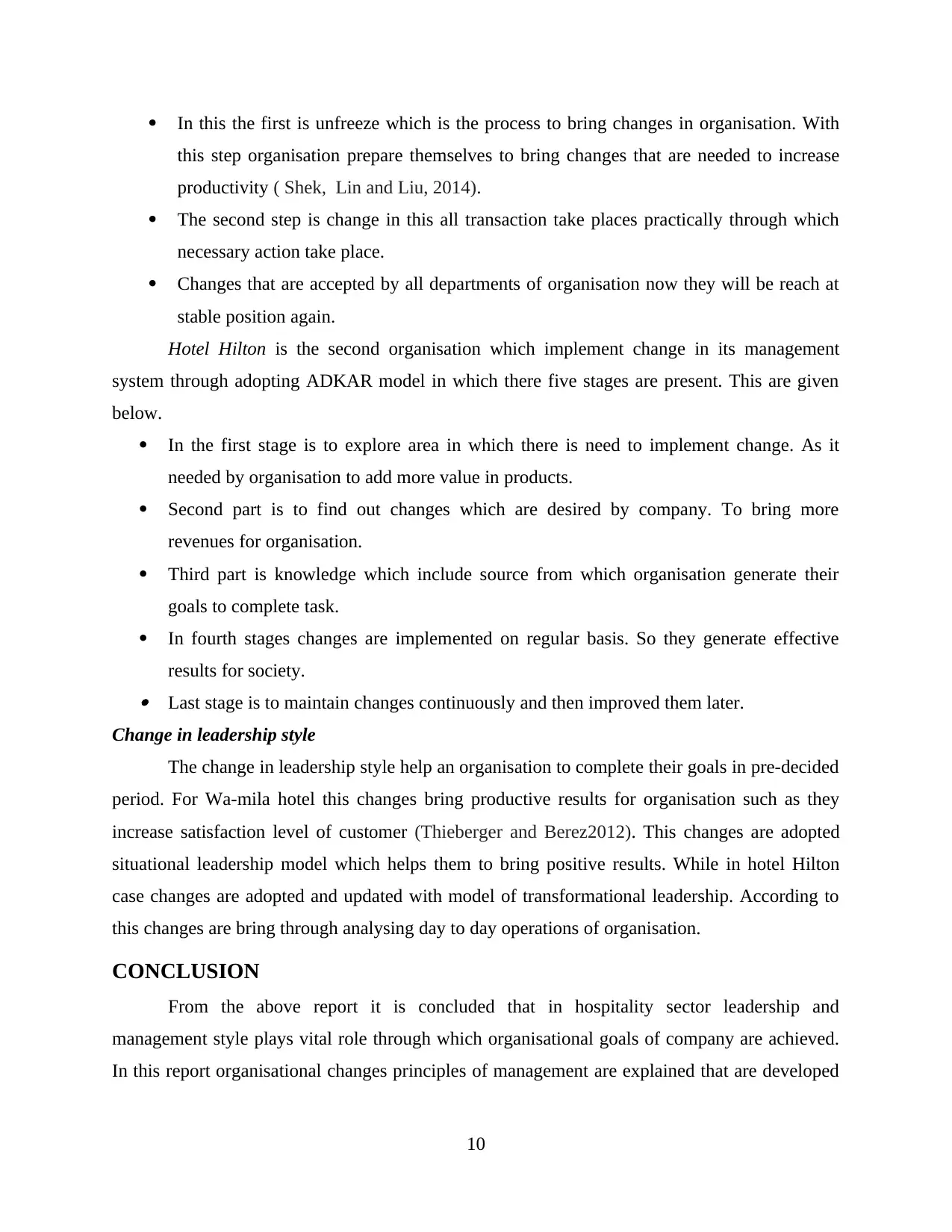
In this the first is unfreeze which is the process to bring changes in organisation. With
this step organisation prepare themselves to bring changes that are needed to increase
productivity ( Shek, Lin and Liu, 2014).
The second step is change in this all transaction take places practically through which
necessary action take place.
Changes that are accepted by all departments of organisation now they will be reach at
stable position again.
Hotel Hilton is the second organisation which implement change in its management
system through adopting ADKAR model in which there five stages are present. This are given
below.
In the first stage is to explore area in which there is need to implement change. As it
needed by organisation to add more value in products.
Second part is to find out changes which are desired by company. To bring more
revenues for organisation.
Third part is knowledge which include source from which organisation generate their
goals to complete task.
In fourth stages changes are implemented on regular basis. So they generate effective
results for society. Last stage is to maintain changes continuously and then improved them later.
Change in leadership style
The change in leadership style help an organisation to complete their goals in pre-decided
period. For Wa-mila hotel this changes bring productive results for organisation such as they
increase satisfaction level of customer (Thieberger and Berez2012). This changes are adopted
situational leadership model which helps them to bring positive results. While in hotel Hilton
case changes are adopted and updated with model of transformational leadership. According to
this changes are bring through analysing day to day operations of organisation.
CONCLUSION
From the above report it is concluded that in hospitality sector leadership and
management style plays vital role through which organisational goals of company are achieved.
In this report organisational changes principles of management are explained that are developed
10
this step organisation prepare themselves to bring changes that are needed to increase
productivity ( Shek, Lin and Liu, 2014).
The second step is change in this all transaction take places practically through which
necessary action take place.
Changes that are accepted by all departments of organisation now they will be reach at
stable position again.
Hotel Hilton is the second organisation which implement change in its management
system through adopting ADKAR model in which there five stages are present. This are given
below.
In the first stage is to explore area in which there is need to implement change. As it
needed by organisation to add more value in products.
Second part is to find out changes which are desired by company. To bring more
revenues for organisation.
Third part is knowledge which include source from which organisation generate their
goals to complete task.
In fourth stages changes are implemented on regular basis. So they generate effective
results for society. Last stage is to maintain changes continuously and then improved them later.
Change in leadership style
The change in leadership style help an organisation to complete their goals in pre-decided
period. For Wa-mila hotel this changes bring productive results for organisation such as they
increase satisfaction level of customer (Thieberger and Berez2012). This changes are adopted
situational leadership model which helps them to bring positive results. While in hotel Hilton
case changes are adopted and updated with model of transformational leadership. According to
this changes are bring through analysing day to day operations of organisation.
CONCLUSION
From the above report it is concluded that in hospitality sector leadership and
management style plays vital role through which organisational goals of company are achieved.
In this report organisational changes principles of management are explained that are developed
10
⊘ This is a preview!⊘
Do you want full access?
Subscribe today to unlock all pages.

Trusted by 1+ million students worldwide
1 out of 14
Related Documents
Your All-in-One AI-Powered Toolkit for Academic Success.
+13062052269
info@desklib.com
Available 24*7 on WhatsApp / Email
![[object Object]](/_next/static/media/star-bottom.7253800d.svg)
Unlock your academic potential
Copyright © 2020–2026 A2Z Services. All Rights Reserved. Developed and managed by ZUCOL.





